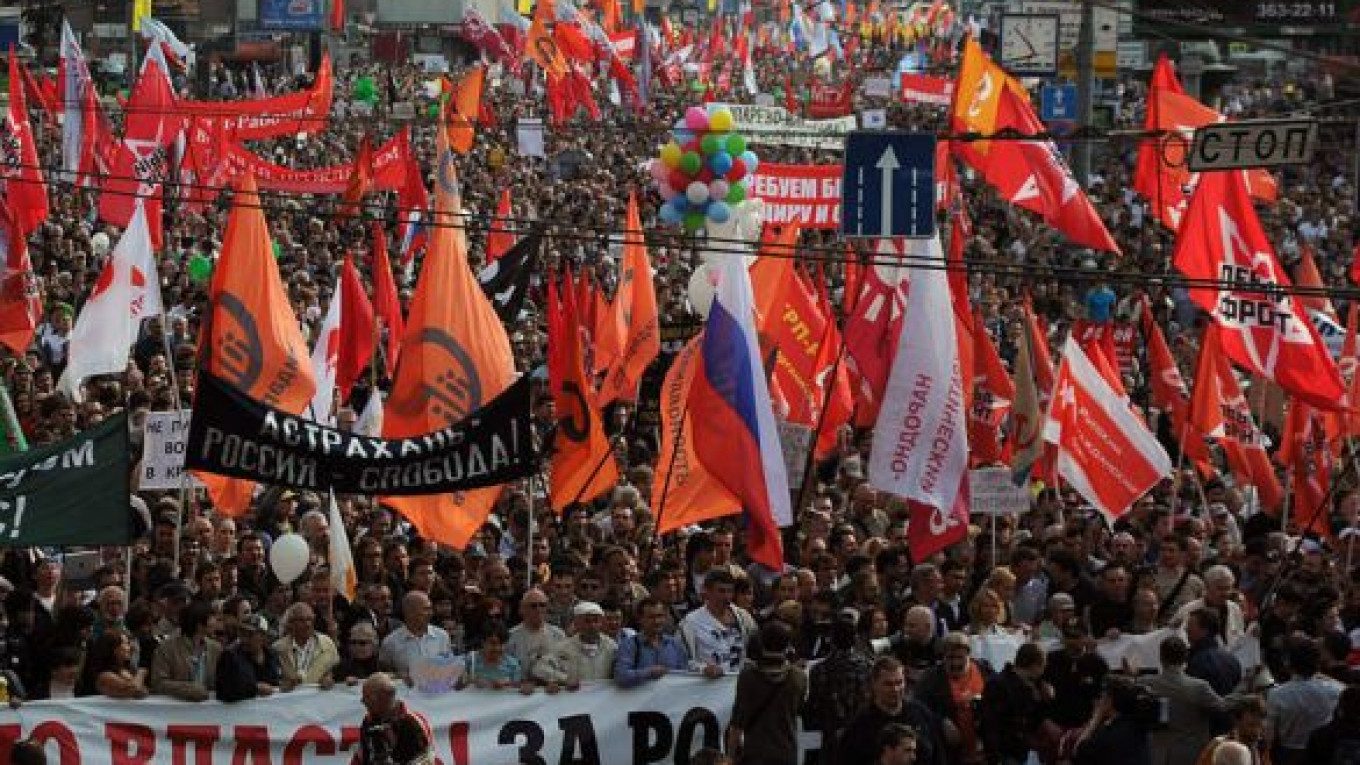President Vladimir Putin signed into law Friday a controversial bill that dramatically raises fines on illegal protests.
The law's enactment comes just days before the next planned mass opposition rally and sets the stage for the next confrontation with a street-protest movement now in its seventh month.
The law raises the fine for participating in an unsanctioned rally to as much as 300,000 rubles ($9,000). The fine for organizing an unsanctioned rally was raised to 1 million rubles for organizers.
Maximum fines for both offenses are currently 5,000 rubles or less.
Supporters of the bill, which was passed by the United Russia-controlled State Duma on Tuesday, said the measure was needed to protect bystanders. It was prompted by the violence that rocked the last rally, which was in May.
Critics said it was the latest crackdown on pro-democracy activists.
The signing coincided with the announcement that City Hall and opposition leaders had agreed on the terms of the next demonstration, which promises to draw tens of thousands to central Moscow on Tuesday's Russia Day holiday.
According to the agreement, marchers will gather at noon on Pushkin Square and march along the Boulevard Ring from 1 to 3 p.m. to Prospekt Sakharov, where a rally will take place from 3 to 6 p.m., opposition leader Sergei Udaltsov wrote on his Twitter blog.
Activists and analysts said the higher fines could embolden opposition-minded voters and discourage others from taking to the streets, as they have done several times since parliamentary elections in December were dogged by allegations of widespread fraud.
Pro-Kremlin deputies proposed the bill after an unexpectedly large demonstration held on the eve of Putin's May 7 inauguration quickly turned into a bloody melee, mostly between masked youths and riot police, that ended with more than 400 detained.
Detentions continued throughout the ensuing weeks as activists staged spontaneous roving “strolls” and established Occupy-style encampments, including one at Chistiye Prudy that served as a makeshift opposition base camp until a court order prompted police to clear it in a dawn raid.
The continuous demonstrations drew cheers from opposition supporters and scowls from others. Only 15 percent of Russians support the protest marches and camps, according to a poll late last month by the independent Levada Center.
Acting in the name of public safety and harmony, the ruling United Russia party pushed the stricter law through the State Duma in a 241-147 vote at midnight Tuesday.
That concluded more than a week of dramatic speeches and foot-dragging by opposition lawmakers, who said excessive fines would stoke tensions.
The average yearly salary in Russia is $8,500, according to the government.
Opposition leaders have proposed that fines be paid with collective donations.
Activists and analysts were divided on what to expect from the Russia Day rally, including what effect the new, higher fines would have.
“People are angry about the new law. It's going to drive turnout up,” said Sergei Davidis of the Solidarity movement, who was one of the opposition's negotiators. Davidis said before the rally received City Hall's approval that he didn't expect violence if the rally were sanctioned.
Alexei Mukhin, an analyst at the Center for Political Information, said the rally would be a flop.
“Many Muscovites will go to the country to barbecue, so it's not going to be a large rally,” he said.
“It's an important day, but it's not likely to be a turning point,” said Alexei Makarkin of the Center for Political Technology. “It's important for the opposition to show that people continue to demonstrate, that it has popular support.”
Fears of a crackdown persisted Friday as two more detentions were made in connection with violence at the May 6 rally.
The Investigative Committee said in a statement that Mikhail Kosenko kicked a riot policeman and broke his finger and that Stepan Zimin threw chunks of asphalt.
Opposition leaders said the Kremlin provoked the violence by creating a bottleneck and possibly hiring ruffians, many wearing masks, to attack riot police.
A Message from The Moscow Times:
Dear readers,
We are facing unprecedented challenges. Russia's Prosecutor General's Office has designated The Moscow Times as an "undesirable" organization, criminalizing our work and putting our staff at risk of prosecution. This follows our earlier unjust labeling as a "foreign agent."
These actions are direct attempts to silence independent journalism in Russia. The authorities claim our work "discredits the decisions of the Russian leadership." We see things differently: we strive to provide accurate, unbiased reporting on Russia.
We, the journalists of The Moscow Times, refuse to be silenced. But to continue our work, we need your help.
Your support, no matter how small, makes a world of difference. If you can, please support us monthly starting from just $2. It's quick to set up, and every contribution makes a significant impact.
By supporting The Moscow Times, you're defending open, independent journalism in the face of repression. Thank you for standing with us.
Remind me later.


